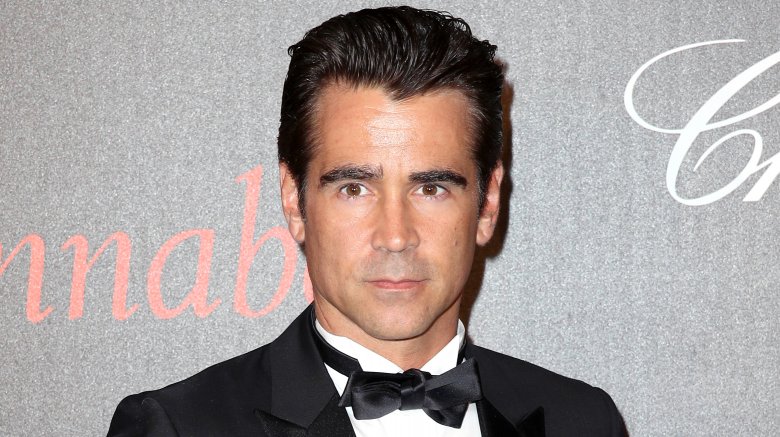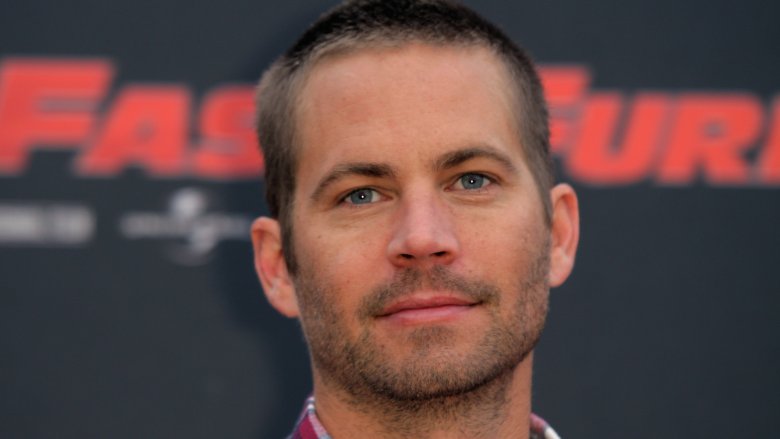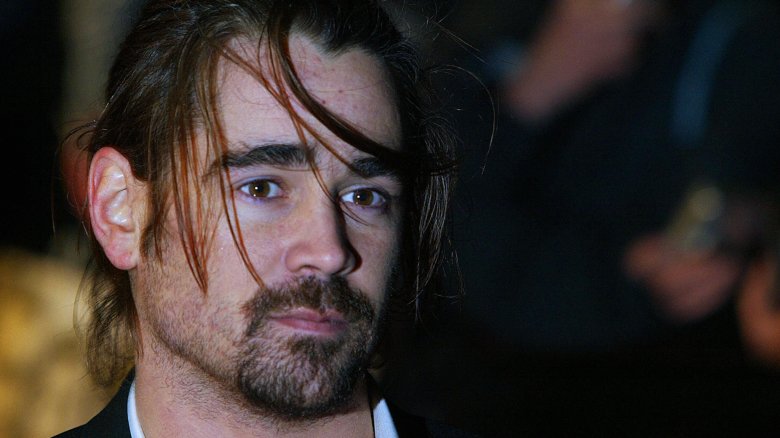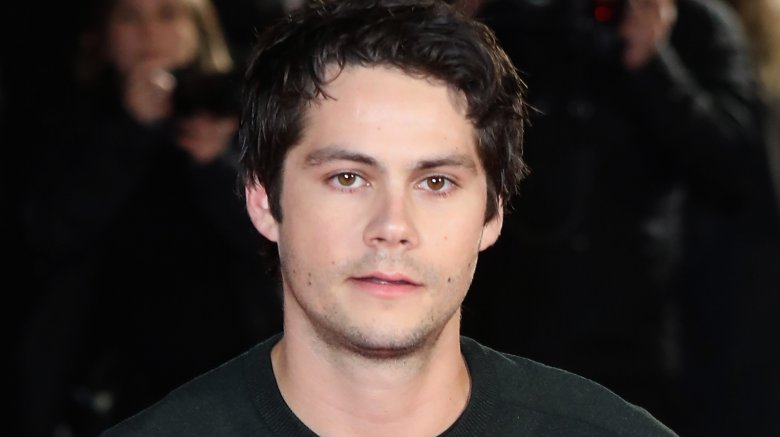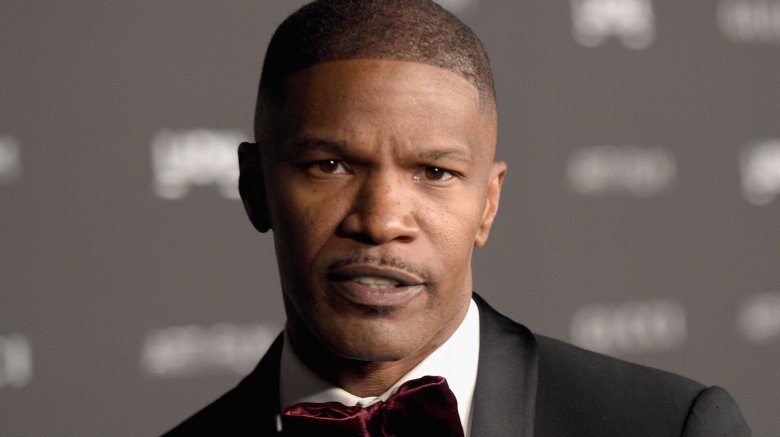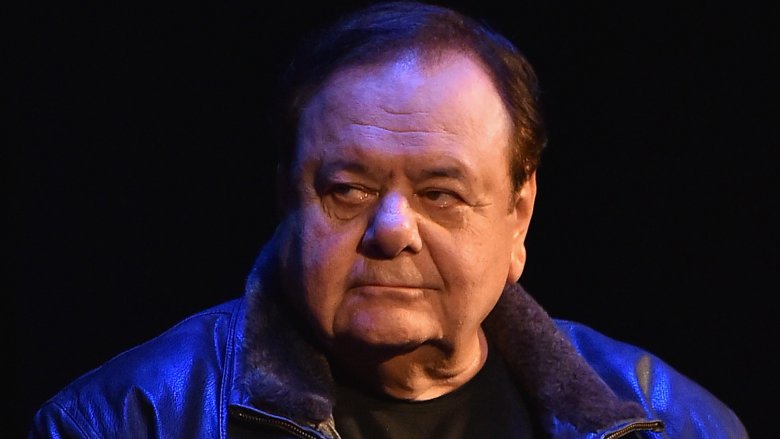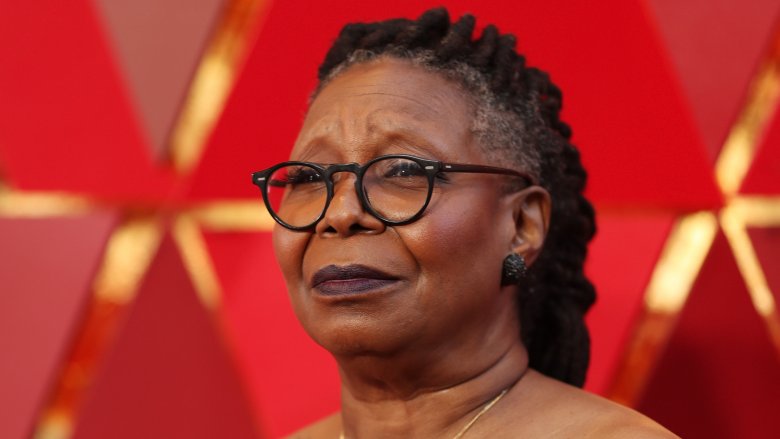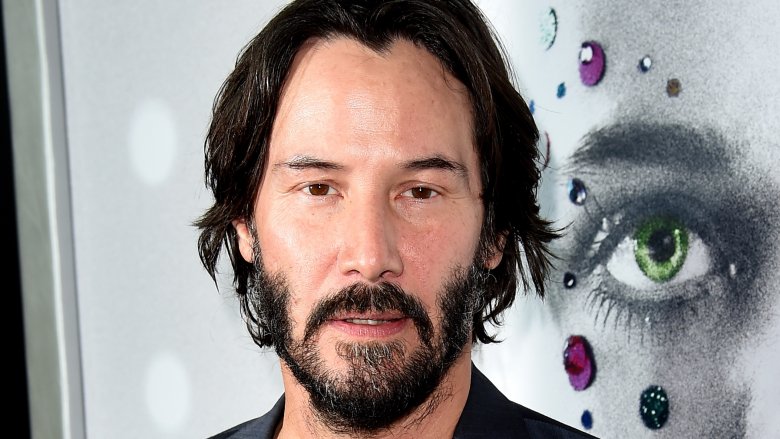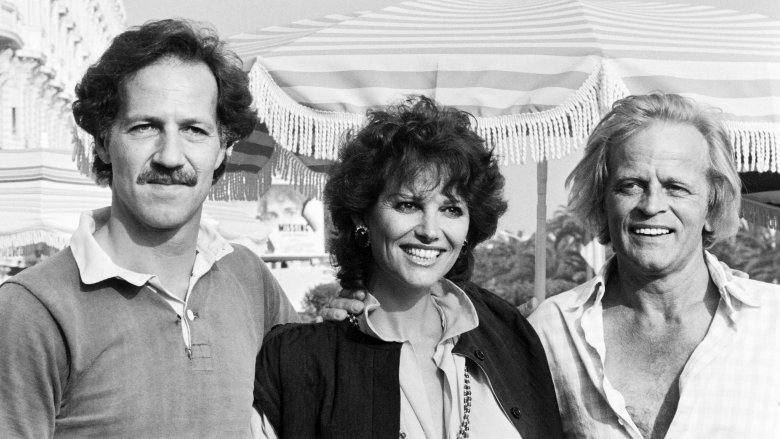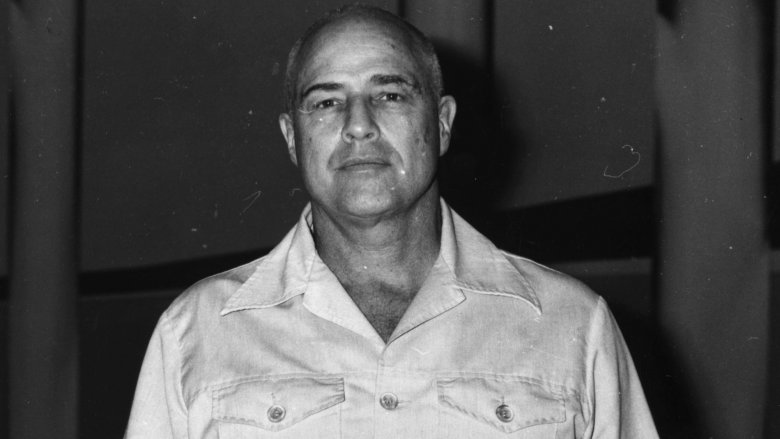Movies That Almost Made Actors Quit
From the outside looking in, an actor's life may seem blessed, but all that fame, fortune, and fantasy is not always as glamorous and magical as it seems. Though the best actors make their jobs look easy, acting is a challenging profession, and certain roles demand that stars push themselves to their physical and mental limits. Then there's the business side of the industry, which forces celebs to consider how every every performance might impact their career moving forward. Sometimes, these situations bring the stars to their breaking points.
From viscous battles among cast and crew, to scathing reviews and post-traumatic stress, find out which stars considered walking — or running — away from showbiz. Weight-loss pressure, forged documents, and series injuries are just some of the reasons the following movies made actors almost quit — a single film, a whole franchise, or even the acting profession altogether.
Paul Walker sees the end of the road for The Fast and the Furious
After completing three films in The Fast and the Furious franchise, star Paul Walker put the future of the extremely successful films in limbo when he decided not to accept a role in the fourth film. Walker's cameo role in the third film, The Fast and the Furious: Tokyo Drift, seemed to suggest that his involvement with the franchise was winding down, but when the studio asked him to return for the fourth film, it reportedly envisioned Walker in a starring role. Walker disagreed.
"I thought [the franchise] was stale," Walker told the Los Angeles Times. "I was like, 'Are you kidding me? Really?' Obviously, we made the first one that catered to pop culture and a youth-driven audience. But trends shift overnight with that audience. Nine years later, I really questioned if there was even an audience anymore."
Denied by Walker, the franchise's producer, Neal Moritz, pulled out the heavy artillery, calling on Walker's co-star and friend, Vin Diesel, to help persuade "Brian O'Conner" to return to the fold.
The plan worked. Diesel reportedly convinced Walker to return for one more film — a commitment that later morphed into four more films. Sadly, Walker died in a car crash before filming on Furious 7 was complete. To finish that movie, Walker's two brothers stepped in to fill in the blanks for the performance.
Colin Farrell wants to stop apologizing for Alexander
Colin Farrell is a perfect example of how fickle a life in the spotlight can be. Once one of Hollywood's biggest stars, Farrell found himself doubting his entire future in the industry after one negatively received performance.
The role that almost ruined him was the titular part in Oliver Stone's Alexander. Failing both critically and financially, Alexander's poor reception affected everyone involved in its making, but Farrell may have had it the worst.
"I'm not going to apologize for how much it affected me emotionally and psychologically," he said in an interview with the Irish Independent. "I was going to walk away from acting. I couldn't buy a packet of cigarettes without feeling I needed to apologize to the guy behind the counter in case they saw the f***ing thing."
Thankfully for his fans, Farell reconsidered and stuck with it, even finding some humor in his misery. "If you're going to fail," he said. "Fail spectacularly."
A shell-shocked Dylan O'Brien questions his acting future
After breaking out with a role on television's Teen Wolf, Dylan O'Brien took to film, starring in the Maze Runner franchise. The first two entries in the trilogy proved enormously successful, both opening at No. 1 at the box office. Then, while filming the third film in March 2016, disaster struck. While performing a high-speed stunt for Maze Runner: The Death Cure, O'Brien, who was rigged up in a harness on top of a vehicle, was pulled off of one car and struck by another.
O'Brien was seriously injured, and in the aftermath of the accident, he began to doubt his future as an actor. "I was so consumed by what was going on in my life at the time that I couldn't really imagine acting again," he told Cosmopolitan. "It was hard for me to be able to envision being on set again, and you lose function in that sense for a while, along with daily function and occupational type function. You get shell-shocked."
Roughly six months later, O'Brien returned to the Maze Runner set to complete the film and the trilogy. Despite his reservations, the young actor is happy he persevered. "Obviously it was a task to push through," he said, "but, once I did, it was the best decision I ever made."
Emma Thompson loses it when weight is discussed
Emma Thompson says she's been a "card-carrying, radical feminist" since age 19, but throughout her career, the actress' convictions have been put to the test. In a discussion on Norwegian journalist Fredrik Skavlan's talk show, Skavlan, Thompson said industry pressure for young actors, particularly women, to look a certain way is "evil" and "getting worse."
One particular film shoot stood out above the rest for her. Thompson recalled a time on the set of Brideshead Revisited in 2007 when she overheard producers talking to one of her female co-stars. "The producers said to her, 'Will you lose some weight?' She was absolutely exquisite," Thompson recalled. "I said to them, 'If you speak to her about this again, on any level, I will leave this picture. You are never to do that.'"
Considering Thompson completed the film, let's assume her ultimatum made its point: Thompson is not a woman who takes matters of weight lightly.
Things get too real for Jamie Foxx on The Soloist
Jamie Foxx is a skilled and successful comedian, singer, and actor, but even the strongest of stars face obstacles. Foxx reportedly lost his way in the biz in 2008, while preparing for a starring role in The Soloist. In the film, he plays Nathaniel Ayers, a talented and homeless musician with schizophrenia. The problem with the part: as Foxx found the character, he lost himself. "I was in a bad place," he told the Los Angeles Times. "I felt like I might be literally losing my mind."
During filming, Foxx reportedly suffered from panic attacks and paranoia. The actor told CNN that he met with a psychiatrist who warned him that taking on the role could trigger post-traumatic stress stemming from an experience Foxx endured more than 20 years prior to The Soloist. When he was 18 and in college, Foxx says someone slipped something into his drink. "I lost my mind and they had to take me to the hospital," he said. "For 11 months it was tough." The Oscar-winner said he battled flashbacks as he tried to recover. "I kept thinking, 'I can't live like this,'" he told the Los Angeles Times.
The fear of that anguish coming back into his life made Foxx question if he should or could continue filming. "I thought about just walking away from this movie," he said. Foxx obviously soldiered on, turning in a moving and memorable performance.
Paul Sorvino can't find the gangster within him
Many film fans know Paul Sorvino best as Paulie Cicero, the imposing mob boss in Goodfellas. Sorvino's convincing performance in that film is part of what makes it so iconic, but aside from being an Italian American from Brooklyn, N.Y., Sorvino shares little in common with the movie mobster. In fact, the distance between Sorvino and Cicero made finding his groove incredibly difficult.
During a panel discussion at the Tribeca Film Festival in 2015, Sorvino revealed that he was planning to quit Goodfellas four weeks into production because he couldn't find the character within himself. "I am a poet. I'm an opera singer. I'm an author. None of it is gangster," he explained. "When I was trying to find this, I was really at a loss. ... So, I called [my agent] up and said, 'Get me out.'"
But before his agent could pull the plug, Sorvino found what he was looking for. While fixing his tie in the mirror one day, he recalled looking up and seeing the face of Paulie looking back at him. According to Sorvino, that introduction "scared the hell" out of him.
Whoopi Goldberg tries to ghost Theodore Rex
Those involved in Theodore Rex would likely be better off if it everyone forgot it even existed. Instead, the film now lives on in infamy as one of the most expensive straight-to-video movies ever made. For the movie's star, Whoopi Goldberg, this clunker marks a particularly trying time in her life because she was sued for breach-of-contract after trying to back out of the buddy-cop movie that partners her with a talking dinosaur.
According to the film's creative team, at some point between supposedly agreeing to accept the starring role in Theodore Rex and her subsequent refusal to return the team's phone calls, Goldberg decided that she no longer wanted to do the movie. The production team filed suit against Goldberg in March of 1993, accusing the actress of verbally agreeing to star in the film — a claim she denied.
However, Richard Abramson, the film's producer, reportedly had an answering machine recording of Goldberg saying that she was committed to the film. That evidence allowed the court to force the actress to either star in the film or face serious financial repercussions for backing out. Reluctantly, Goldberg settled the lawsuit by agreeing to star in the film.
Keanu Reeves forced to act over a forged signature
Keanu Reeves probably keeps his friends a lot closer than he used to because, back in 2000, the actor found himself in a sticky situation after a so-called pal allegedly forged the actor's signature on a binding contract.
In an interview with the Calgary Sun (via The Guardian), Reeves said director Joe Charbanic approached him to do a film called The Watcher, but he turned down the offer. Reeves later found out that his assistant went behind his back and committed him to the role. Unhappy with his situation but unable to escape the film, Reeves kept quiet and showed up to the set, contractually obligated to keep his negative thoughts to himself. Then, one year after the release of The Watcher – and one year after refusing to promote the film — Reeves spoke about the ordeal.
"I never found the script interesting," he said. "But a friend of mine forged my signature on the agreement ... I couldn't prove he did and I didn't want to get sued, so I had no other choice but to do the film."
Klaus Kinski quits … and quits again
The great Klaus Kinski (right) and director Werner Herzog (left) are known for their very turbulent relationship. The documentary My Best Fiend recounts much of their story, highlighting some of their most tempestuous moments over the years. In that film (via the Post-Gazette), Herzog recalls a particularly troubling period during the production of 1972's Aguirre, the Wrath of God. On set, Kinski and Herzog allegedly butted heads incessantly, and eventually, those threats took a dark and violent turn.
"Kinski walked off, packed all his things and was absolutely serious about quitting and leaving at once," Herzog recalled. "He'd already broken his contract 40 or 50 times. I went up to him and said, 'You can't do this.' I told him I had a rifle and that he'd only make it as far as the first bend before he had eight bullets in his head — the ninth one would be for me."
Marlon Brando, from Apocalypse Now to apocalypse never
Many of the stories told about Marlon Brando on the set of Francis Ford Coppola's Apocalypse Now may be apocryphal, but the tale told by the film's director in the documentary Hearts of Darkness: A Filmmaker's Apocalypse, seem to validate at least some of the bold claims about Brando.
One of the more pervasive stories from the set alleges that Brando was hesitant to shoot the movie well before he showed up for the first day of filming. He reportedly resisted coming to the set at all, and when he finally did arrive, he was reportedly overweight and unprepared. Brando, who had already accepted his $1 million signing bonus, supposedly only committed to three weeks of shooting and threatened to leave the set after fulfilling that commitment, even though the film was nowhere near complete. This tug-of-war between Brando and Coppola continued all the way to the end of the production.
Despite all the drama, the film was finished with Brando in tow, and the stormy production is now part of what makes Apocalypse Now such a powerful film today.

